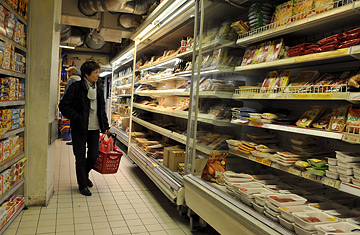
A customer walks the aisle at a supermarket in Paris, France, on February 26, 2008.
The turmoil in the world economy is hitting the French where it hurts this epicurean nation hardest — on their dinner tables. "It's crazy. You'd think we were heading into a war or something with the way prices keep rising," says a woman who warily gives her name only as Sylvie as she exits a central Paris supermarket. "People aren't going to be able to keep up soon if this continues." But anger, rather than resignation, may become the dominant response as French consumers begin to smell a whiff of profiteering at work.
Inside the store, there's grimacing in the dried goods sections, and sighs of lament resound amid the refrigerated dairy products. Ash shoppers near the checkout, the tension is palpable as they brace for the latest hit from France's worst episode of price inflation in decades.
According to a new study by France's National Institute of Consumption (INC), prices for foodstuffs rose from between 5% and 48% between November and January. And this after an earlier wave of inflation had already sent many prices up by double digits since July.
The biggest jolts have come from baked goods, dairy products and desserts such as chocolate, says Pauline Martin, a mother of four from the Lyon area who works in marketing. For months now, she has noticed fellow shoppers down-shifting to the cheapest options, such as store-brand items. "The pressure on shopping budgets has gotten strong enough that its starting to strain wider household budgets," Martin reports. With 500 grams of dried pasta up by over 40% to $2, a 200-gram box of Breton butter cookies up around 30 cents to $1.60, a 250-gram bar of butter risen from $2.40 to $3, and a gloriously smelly 200-gram hunk of Melun Brie now costing over $7.50, France's fabled quality of life is taking a hit. Even the staple baguette has also jumped above its symbolic one euro ($1.50) level in most bakeries, rising by around 15% since the summer. Nor can French shoppers comfortably drown their sorrows, with a six-pack of domestic beer now up by around 20% to nearly $7, while a mid-range supermarket bottle of Cte du Rhone is up about 10% to $17.
Food companies put the blame for the prices rises on a spike in agricultural commodity prices, as demand from giant emerging markets such as China and India meets supplies squeezed by extreme weather patterns. World wheat prices have risen by 74% in a year, while egg prices have soared 36% — and together those figures have driven pasta prices up by over 40% in recent months months. And there's more to come: on Monday, Michel-Edouard Leclerc — president of the giant Leclerc supermarket chain — said he expects food inflation to continue at a quarterly rate of 4%.
Shoppers are reeling: New polls show 81% say their overall purchasing power has shrunk in the past year. And many suspect that corporations are simply using high commodity prices as an excuse for sticking it to consumers. There's ample reason for suspicion.
France's Byzantine laws regulating the food supply create a troubling degree of price obscurity. That haziness, according to some producers — particularly tightly squeezed farmers — allows stores to add markups of over 300% to products bought at cut-rate wholesale prices. That same murkiness, suggests French Secretary of State for Consumption and Tourism Luc Chatel, could be how the recent 30% increase in market prices for milk has sent yogurt prices up by over 25%, even though yogurt's lactic content would justify only a 10% hike.
"I suspect distributors are taking advantage of the situation to further pad their profit margin," comments Pauline Martin, referring to the tight global market for some basic foods. "The increases in prices have been too high, and too general, for there not to be some exploitation at work."
Martin's suspicions are widely shared. Although there are signs of food-price inflation throughout the world, right now, French government studies indicate that prices here are, on average, 5% higher than elsewhere in Europe. That figure prompted French Prime Minister Franois Fillon to announce Monday a "fist-banging operation" investigating producers' and distributors' role in price escalation. "It's to see where the abuses are, to determine what's behind the rising prices and costs internationally, and how much of that is applicable to the French market," Fillon warned.
With public anger over falling purchasing power now a major factor in President Nicolas Sarkozy's plummeting approval ratings, there will be hell to pay if it turns out any hanky-panky is fueling the inflation. And now it seems there is. On Wednesday, Le Figaro reported France is officially investigating price-fixing allegations against nine European and U.S. household product companies — including Unilever and Procter & Gamble. If found guilty of that offense, those groups could be fined up to 10% of their annual global revenue — a financial sting sure to be compounded if consumers retaliate via boycotts.
